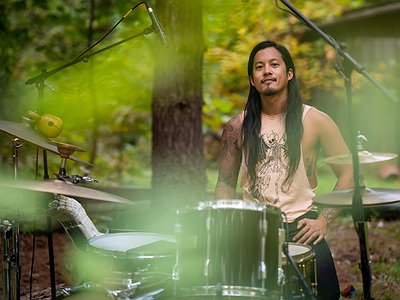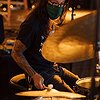Part 1
Name: Thom Nguyen
Nationality: Vietnamese-American
Occupation: Drummer, sound artist
Current Release: Thom Nguyen's Exits is out now on Sige.
Recommendations: 1. Marshall Trammell just came out with an amazing piece, “Eleven Postures.” “Images were made with UGRR-inspired branding irons addressing Native/Black/Mestizo enslavement, fugitivity, self-determination, rebellion and celebration.”
2. Faith Coloccia makes beautiful art and music. She created the artwork and design for this release which I’m so stoked about and go scope all of her other art out there!
If you enjoyed this interview with Thom Nguyen, visit his linktr.ee for links to performances and more information. For further reading, check out one of his frequent collaborators in our Tashi Dorji interview.
When did you start writing/producing music - and what or who were your early passions and influences? What was it about music and/or sound that drew you to it?
Hearing Terry Riley’s “In C” and Philip Glass’s “Glassworks” changed my perspective on structures and opened up the world of repetition and phrasing. This Heat’s “Deceit” was a total mind melt!
My friend Rafi Bookstaber introduced me to the great free jazz/improvising masters like Milford Graves, Rashied Ali, etc. He pulled out “Babi” and “Duo Exchange” one day and my mind exploded. I couldn’t wrap my head around what I was hearing and watched live performances and was all in from there. I decided to start working on my own material about five years ago as I’d been content with drumming in bands spanning multiple genres over the years.
For most artists, originality is preceded by a phase of learning and, often, emulating others. What was this like for you: How would you describe your own development as an artist and the transition towards your own voice?
I’ve only recently become comfortable with my playing. My musical compatriot and dear friend Tashi Dorji has shown me a path in free improvisation, especially playing in our duo MANAS, that I’m more drawn to. It feels liberating to play as two brown people that seek a more validating open minded world.
I’ve toured my whole life in different bands and those experiences have enhanced my musical outlook tremendously. Meeting musicians of all kinds of backgrounds has helped center myself and my thoughts. Growing up I emulated heavy hitting drummers. Being able to let loose my anger or any emotions on the drums is a form of therapy for me and channeling that into music mostly works out well.
How do you feel your sense of identity influences your creativity?
I’m adopted and have kept putting off searching for my birth parents and wish I was raised in my own culture, which seems foreign now. I feel similar with music in that I’ve been drifting from different genres for years not knowing where I fit in but I believe I’ve recently found the direction I want to pursue and have become more critical of future collaborative projects.
Figuring out my place as a drummer has been difficult and a long journey but as long as I surround myself with fun and interesting players I am pretty content in whatever sounds we conjure. I’ve become better at being patient and knowing when to step back than to overplay in different settings.
What were your main creative challenges in the beginning and how have they changed over time?
Becoming comfortable in live settings whether it be with a group of improvisers or playing solo sets was the first step.
I can’t quite remember the first set I did but I was definitely nervous as hell, which I still am. My pal and inimitable drummer Tyler Damon reassured me that I’d be just fine when I started them. Throwing myself out there was a big leap in growing and learning what to do next and thinking critically but not too critically about each performance. I kept thinking, well you gotta start the set somehow so hit these objects and listen to the tones and room reverb response and evolve from there. It can’t always be a shit show, but it absolutely most definitely can be.
I started out with acoustic drums and percussion but later integrated a 4-track with recorded drones and a keyboard through a distortion pedal. I thought I needed some other background noise but I’m back to an all acoustic set up currently.
One time in Montreal I was thrown in a late night improvising group of strangers after a MANAS trio set with Wes McCoy and somehow underplayed. I was waiting for one of them to let loose and go off but they were all waiting on me as the guest to start revving things up. I drunkenly didn’t realize what I was getting into and Tashi later told me the deal. Oh well, lesson learned and moving forward.
As creative goals and technical abilities change, so does the need for different tools of expression, be it instruments, software tools or recording equipment. Can you describe this path for you, starting from your first studio/first instrument? What motivated some of the choices you made in terms of instruments/tools/equipment over the years?
My parents signed me up for piano lessons when I was a child so that was my first real instrument. I think it coincides with drumming as it is percussive, hitting highly tensioned strings with tiny wooden sticks is similar to highly tuned drumheads hit with somewhat larger sticks. One day I told my mom I was quitting because I didn't think girls would find it attractive and she told me I was wrong, and of course she was definitely right. The only recorded piano material I have is on my bandcamp page titled "For Emma" in which you can hear all the imperfections as I've never been able to play perfectly at any instrument and I've learned to embrace that.
I was finally able to create space for a tiny studio in my basement two years ago when I moved in with my now fiancé, Emma. I use an 8 channel interface with Reaper which I’m content with it’s limitations. I’m always collecting all sorts of gear as I run a small drum rental and repair business, Batteria Backline. I’ve been able to customize individual drums and create combination “jazz” kits to use or sell.
The option to choose from those warm resonant open tones or big pummeling rock sounds has been perfect for different settings. That’s one positive thing that the pandemic has provided me, having more time at home than on the road to work on recordings and less band practices. I’ve expanded my gear with a synth, tape echos, keyboards, and lately I’ve been layering fuzzed out bass drone feedback.
I always ask my musical cohort Jerm, who recorded this album, for technical recording advice. He's shown me a ton of tips and tricks on everything from EQ to mic placement to killer VST software. Check out his project's Drought Year and Bleach Birth!
Have there been technologies or instruments which have profoundly changed or even questioned the way you make music?
I love drone music and have procured a Harmonium, a Harmophone (electric fan driven harmonium), and different gongs. I was recently gifted the Microcosm pedal from Hologram Electronics that creates some pretty epic tones. I’ve been using a bass and Yamaha CP keyboard through it with highly satisfying results.
I’ve got a dark drone piece using all the instruments above on Medium Sound, based in Indianapolis, coming out soon that I’m excited about.






